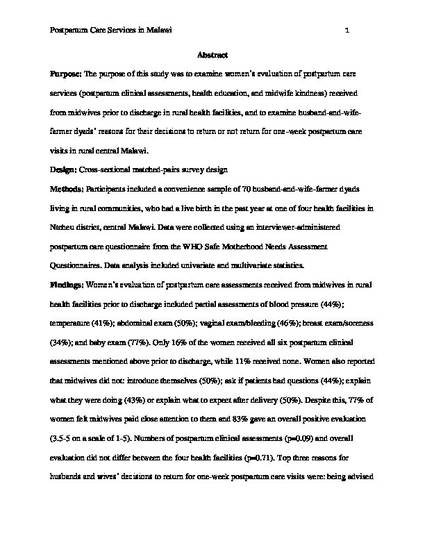
Article
Use and Evaluation of Postpartum Care Services in Rural Malawi
Journal of Nursing Scholarship
(2017)
Abstract
Purpose: The purpose of this study was to examine women’s evaluation of postpartum care services (postpartum clinical assessments, health education, and midwife kindness) received from midwives prior to discharge in rural health facilities, and to examine husband-and-wife-farmer dyads’ reasons for their decisions to return or not return for one-week postpartum care visits in rural central Malawi.
Design: Cross-sectional matched-pairs survey design
Methods: Participants included a convenience sample of 70 husband-and-wife-farmer dyads living in rural communities, who had a live birth in the past year at one of four health facilities in Ntcheu district, central Malawi. Data were collected using an interviewer-administered postpartum care questionnaire from the WHO Safe Motherhood Needs Assessment Questionnaires. Data analysis included univariate and multivariate statistics.
Findings: Women’s evaluation of postpartum care assessments received from midwives in rural health facilities prior to discharge included partial assessments of blood pressure (44%); temperature (41%); abdominal exam (50%); vaginal exam/bleeding (46%); breast exam/soreness (34%); and baby exam (77%). Only 16% of the women received all six postpartum clinical assessments mentioned above prior to discharge, while 11% received none. Women also reported that midwives did not: introduce themselves (50%); ask if patients had questions (44%); explain what they were doing (43%) or explain what to expect after delivery (50%). Despite this, 77% of women felt midwives paid close attention to them and 83% gave an overall positive evaluation (3.5-5 on a scale of 1-5). Numbers of postpartum clinical assessments (p=0.09) and overall evaluation did not differ between the four health facilities (p=0.71). Top three reasons for husbands and wives’ decisions to return for one-week postpartum care visits were: being advised to return for care, wanted the mother to be examined, and wanted the baby to be examined. Participants stated prior negative experiences, or not perceiving a need for care (feels fine), may potentially prevent them from returning for postpartum care visits in a health facility.
Conclusions: Most women reported they received only partial postpartum clinical assessments; thus, it is important for health facilities to address the adequacy of postpartum clinical assessments provided to women by midwives before discharge. Women returned for one-week postpartum care visits, because they were advised to return for care, and also to make sure their babies were examined. However, the principal reason why husbands permitted their wives to return for postpartum care was because they wanted their wives to be examined.
Keywords
- postpartum care,
- decision to return for care,
- postpartum evaluation,
- adequacy of care,
- postpartum clinical assessments,
- malawi
Disciplines
Publication Date
January 1, 2017
DOI
10.1111/jnu.12257
Publisher Statement
Post-print housed here. Follow DOI for version of record.
Citation Information
Yenupini Joyce Adams, Manfred Stommel, Adejoke Ayoola, Mildred Horodynski, et al.. "Use and Evaluation of Postpartum Care Services in Rural Malawi" Journal of Nursing Scholarship Vol. 49 Iss. 1 (2017) p. 87 - 95 ISSN: 1527-6546 Available at: http://works.bepress.com/yenupini-adams/7/
